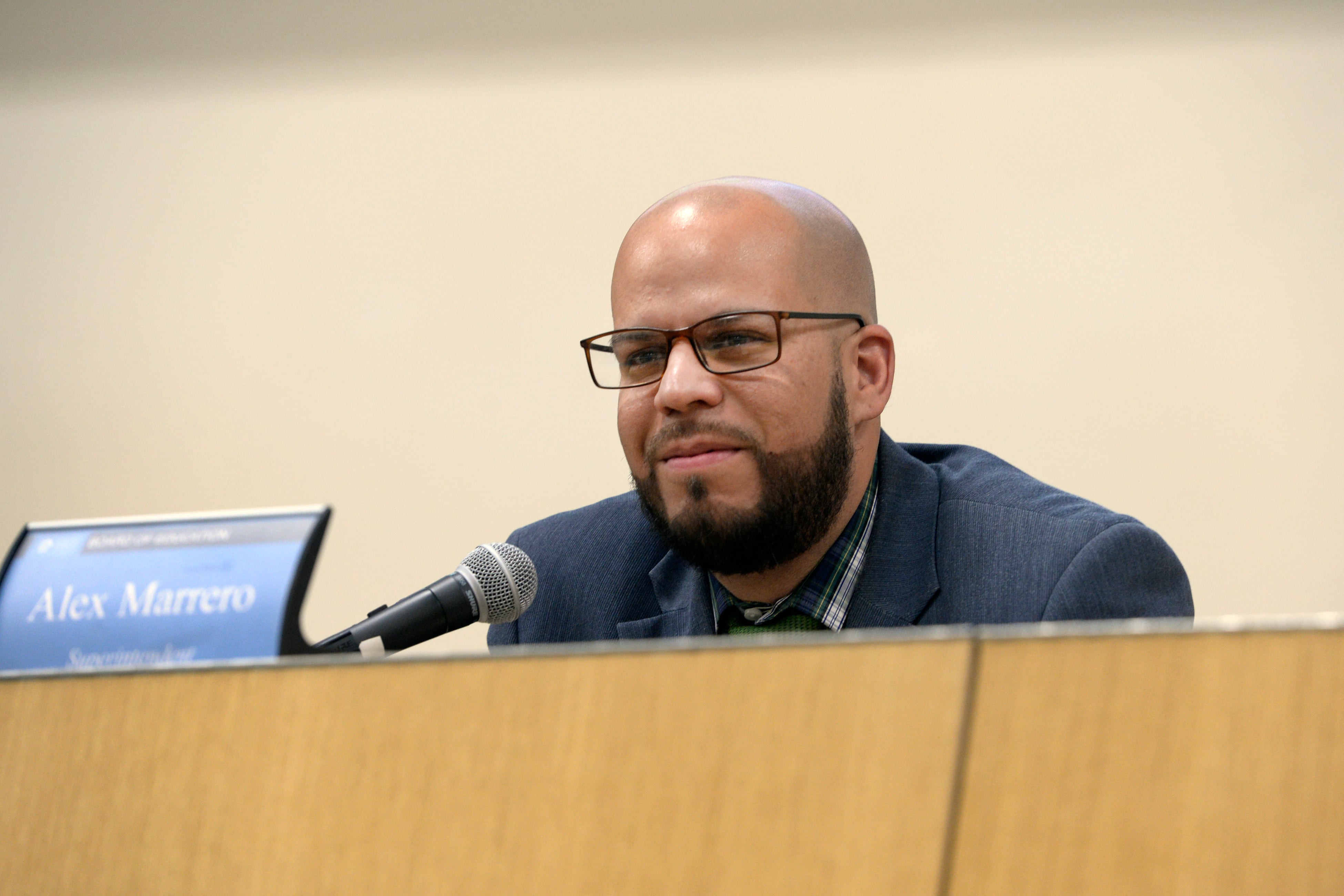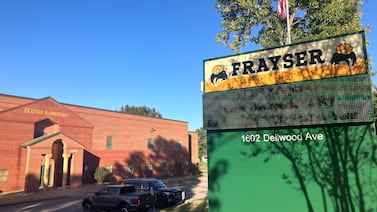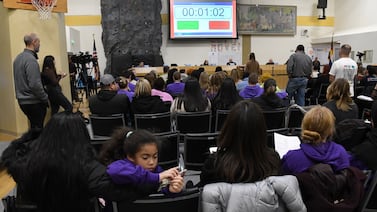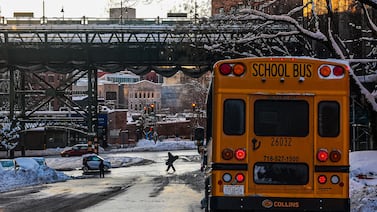Sign up for Chalkbeat Colorado’s free daily newsletter to get the latest reporting from us, plus curated news from other Colorado outlets, delivered to your inbox.
The idea for a new school improvement policy came to Denver Superintendent Alex Marrero after the school board voted against closing a struggling charter school.
Marrero was perplexed. The deal with charters is that the independent public schools are granted more autonomy in exchange for stricter accountability. This school, which Marrero declined to name, had fallen short of the goals it agreed to meet.
So why was it still open? Marrero called some of his mentors for advice.
“One said, ‘Yeah Alex, this is insane. How could you move a system when there is no bar? If it was your school, you would have closed it, right?’” Marrero said. “My answer was no.”
That’s because there has been no active Denver Public Schools policy to close low-performing schools for several years. The last such policy was abandoned in 2018. Marrero’s new policy, which he unveiled at a school board meeting last week, is meant to change that. It sets the same achievement bar for district-run and charter schools — and lays out a series of escalating interventions if they don’t meet it. The most drastic is closure.
Marrero’s School Transformation Process is an administrative policy that he put in place last week without school board approval. But the board will have to vote on any school closures starting in 2026. In interviews this week, not all school board members said they’d support closing a school for low standardized test scores. And although board members expressed optimism about Marrero’s new policy, several said they didn’t understand all the details.
“I don’t know that we’re okay with that,” board member Xóchitl “Sochi” Gaytán said of closing schools for low test scores. Last week’s board meeting, she said, “was the first time we were hearing and seeing that. We were all processing.”
Denver charter school leaders are still making up their minds. Marrero has asked them to agree to the policy, which would mean giving up their right, enshrined in state law, to appeal a closure.
“As public charter schools we believe in accountability across all (school) governance types,” said Taamiti Bankole, the chief external affairs officer for KIPP Colorado Schools and interim chair of the Collaborative Council, a group of charter leaders who advise DPS.
While agreeing to the new policy is optional for Denver’s more than 50 charter schools now, Marrero said it will be “non-negotiable” when each charter’s contract comes up for renewal.
The new plan offers both help and consequences
Like many school districts, Denver Public Schools has a long history with school improvement. Over the years, the pendulum has swung from swift closures of struggling schools that left families reeling to yearslong efforts to give schools extra funding and support.
Marrero’s policy is a middle ground. It’s also a way to beat what’s known as the accountability clock, which ticks toward state intervention. After five years of low state ratings, based mostly on standardized test scores, the State Board of Education can order an intervention, although it’s only ever closed one school under that system.
Marrero’s policy requires the district to take action before the state steps in. After one to three years of low ratings, a Denver school will be “renewed” or “reconfigured” by firing the principal, making teachers reapply for their jobs, or changing academic programs, among other options.
After four years of low ratings, a school will be “reimagined” — a euphemism for closing the school or replacing it with another district-run or charter school.
To keep schools from getting there, the district is launching the Elevate Schools Network, a group of eight elementary schools at risk for such interventions. Unlike in the past, the district won’t send those principals to out-of-state training or hire an external company to turn the school around. Instead, the district’s own central office staff will do the work.
The eight schools in the inaugural cohort will be Barnum Elementary, Cheltenham Elementary, Hallett Academy, John H. Amesse Elementary, McGlone Academy, Oakland Elementary, Place Bridge Academy, and Traylor Elementary.
“Under previous versions, it was just about high-stakes accountability,” said Joe Amundsen, the district’s executive director of school transformation, who will help lead the Elevate Schools Network. “This is saying the district has to be in it with our schools when they’re on the clock. It really puts the onus of responsibility on the district to improve our schools.”
In interviews, school board members expressed the most support for that part of the plan.
“I feel like this isn’t coming from a crime and punishment lens,” said school board President Carrie Olson. “It’s, ‘How can we help you?’”
Marrero said he’s confident that no school in the network will reach Year 4 on the state accountability clock. If one does, he said, “I’ll be the first one to say, ‘We failed this community.’”
Idea of school closures generates mixed reactions
The prospect of school closures is likely to generate the most scrutiny and controversy. And board members’ politics could come into play.
Board Vice President Marlene De La Rosa said she’d be open to closing a school for low test scores. She sent her own two children to schools outside of her neighborhood because the nearby schools were labeled as failing.
“I don’t want to keep letting students be in a school that isn’t meeting their needs,” she said.
Board member John Youngquist said he’s most interested in helping schools get off the state accountability clock, which he believes can be done.
But if schools don’t improve, he said, “You have to take some sort of action.”
Youngquist and De La Rosa were elected in 2023, along with board member Kimberlee Sia. All three of their campaigns were boosted by outside groups supportive of education reform and the closure of low-performing schools. All three are halfway through a four-year term and will likely vote on school closures or replacements under Marrero’s policy.
The other four board members may never take a vote under the new policy because their terms are up in November. They were elected in 2021 with the backing of the Denver teachers union. Three of them are eligible for reelection, but Olson can’t run again due to term limits.
Olson, Gaytán, and board member Scott Esserman have been the most vocal about opposing school closures due to low test scores. Olson was a teacher at Kepner Middle School in 2014 when DPS announced it was shuttering the school for that exact reason. The subsequent disruption inspired her to run for the board in 2017.
Olson said this week that she’s now open to school closures based on declining enrollment, like the ones the board approved this school year. But she said she hasn’t changed her mind about closing schools based on declining test scores.
“It just tears apart the fabric of a community so much that I would want us to think about so many other ways we can support that community and not close schools,” Olson said.
She said Marrero’s plan represents “a longer runway” and is more helpful than what happened at Kepner: “Now schools are going to receive years of support.”
Union opposes making teachers reapply for jobs
Gaytán’s path to the school board was also influenced by a performance-based school closure, not as a teacher but as a neighborhood parent.
“The negative connotation of a school closure impacted not only me, my husband, my children, but entire neighborhoods in southwest Denver,” Gaytán said in 2021 as a candidate. “To put families and teachers through something like that and retraumatize our community is a no vote.”
Gaytán said she’d still vote no on school closures today. But she doesn’t think it will come to that anytime soon — at least not for district-run schools in the Elevate Schools Network.
“I appreciate the fact that there will be an in-house team that would dedicate time to these schools that need this extra support,” Gaytán said.
It may be different for charter schools, which won’t be part of the network. Gaytán was one of two board members who voted in 2023 in favor of closing Academy 360, a small charter school with low test scores. A majority of the board voted to keep it open.
Academy 360 could be one of the first to face closure under Marrero’s policy. It’s one of two Denver schools on Year 3 of the clock. The other, Rocky Mountain Prep Noel, is also a charter.
Esserman helped write the board’s policy on closing schools for low enrollment and fought against using standardized test scores to decide which underenrolled schools to close. The board landed on a compromise that says test scores can’t be the sole factor.
At a board meeting a year ago, Esserman said that when the district closes a school for low test scores, “you’ve now labeled all those students as coming from a failing school and you set them up to continue to not be successful.”
Esserman said this week that his position on standardized testing hasn’t changed. But like Gaytán, he thinks the new policy is different.
“I think it’s really difficult to look at this plan and see it as a punitive measure,” he said.
Rob Gould, president of the Denver Classroom Teachers Association, said that when Marrero gave him “the briefest of briefings” on the policy, the superintendent focused on the Elevate Schools Network, not on the possibility for school closure.
The union opposes closing schools for low test scores, Gould said. It also opposes making teachers at struggling schools reapply for their jobs, which the policy says could happen.
“Time and time over the years, just seeing how making everybody reapply or changing the whole [school] model — is this really making the change you want?” Gould asked. “Or is it that under the guise of disruption, you’re resetting the clock?”
Melanie Asmar is the bureau chief for Chalkbeat Colorado. Contact Melanie at masmar@chalkbeat.org.






